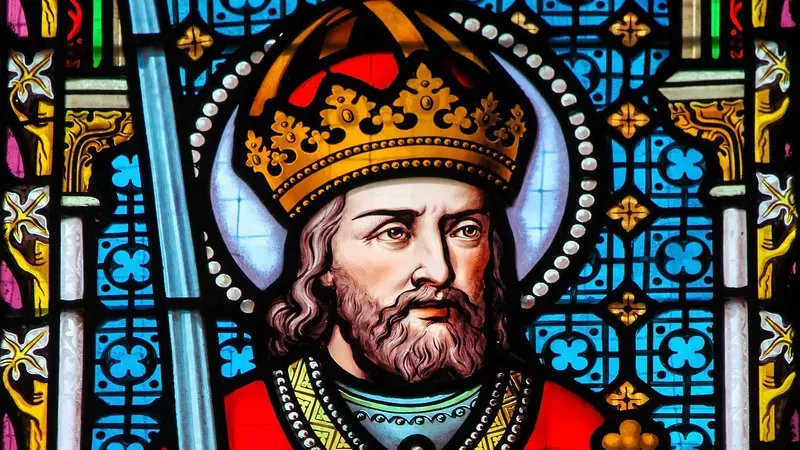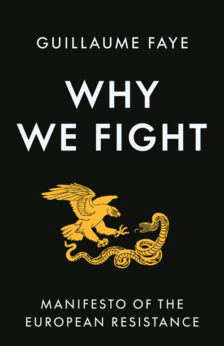On Sunday, 14 May 2023, Ukrainian President Volodimir Zelensky will receive the Charlemagne Prize for “exceptional work performed in the service of European unity.” The Prize will be given to Zelensky himself and to the Ukrainian people. The official citation is full of praise, lofty terms and high ideals, but somehow there is a ring of insincerity about it. Obviously, the Prize is given because eight years after starting a war against what it claims to be its own citizens, the Ukraine is now engaged in a real battle with its Russian neighbor. After shelling cities of the Donetsk and Lugansk regions, killing at least some 15,000 civilians and wounding countless others, Ukrainian soldiers and their NATO mentors now have to face a real enemy.
With European nations, as members of NATO and US vassal states, participating in brutal killing sprees in Yugoslavia, Iraq, Libya, Syria, Afghanistan, and given the violent past of nations like England, France, the Netherlands, Belgium, Germany, Spain, Portugal, Italy, Sweden and Denmark, what right do they have of lecturing Russia? The citation speaks of “an unspeakably brutal Russian war of aggression that contravenes international law, directed against the European Social Order, Security Order and Peace Order, with the objective of destabilising the European community of peoples…”
As for upholding the principle of sovereignty that the EU supposedly holds so high and for which Zelensky is being praised to the skies, like everything else in the citation, it is a cynical sham. If the Ukraine is entitled to sovereignty and independence, what about Catalonia? The last time the Catalans, who since the 17th century have desperately wanted to be sovereign and independent, tried to achieve this peacefully, they were brutally repressed by the government in Madrid and the unelected apparatchiks in the European Commission in Brussels.
Nevertheless, the Charlemagne Prize citation says about Zelensky and the Ukraine: “His country is defending Western values, unassailable principles of coexistence, peace and freedom, and therefore precisely what the European Union stands for politically.” All of it pure baloney.
Since 1950, the German city of Aachen has been giving the annual prize for helping to promote “European unity.” In 1955, it was given to Sir Winston Churchill who, only eleven years before, had in fact been responsible for flattening the ancient city with all its priceless monuments and killing almost two thousand of its citizens. Apparently, the Prize Committee believed that killing men, women and children with aerial bombardments was “exceptional work performed in the service of European unity.”
The Committee still held that view half a century later when it gave the Charlemagne Prize to Tony Blair (1999), Bill Clinton (2000) and Javier Solana (2007). In their respective functions as British Prime Minister, US President and NATO Secretary General, this trio was responsible for destroying the European nation of Yugoslavia and bombing the European nation of Serbia, killing thousands of Serbian men, women and children. Many of those who escaped NATO bombs were contaminated by radioactive material from the depleted uranium munitions dropped on Serbia. Indeed, “exceptional work performed in the service of European unity.”
With such illustrious and meritorious predecessors, it is obvious that Zelensky is quite worthy of the Charlemagne Prize. The European values defended by the guy with the hoarse voice and the olive green t-shirt are actually the same as those of the years 1941-45 when all of Europe was in the East trying to defeat the Red Army.
There is, however, also a lighter side to the Charlemagne Prize, one of which all those self-important, blown-up dignitaries, unelected “democrats,” and bigger and smaller crooks attending the upcoming official ceremony are completely oblivious.
To begin with, it is unlikely that the “Charlemagne” of official history has ever lived in Aachen or even ever set foot there at all. The Roman Catholic Church clearly does not give credence to the official version. Italian historian Giovanni Carnevale has published extensively on the subject. Even if he may be wrong on some points, the evidence he puts forward warrants the conclusion that the Charlemagne of official history is just an invention. Carnevale points out that Charlemagne lived in a city called Aquisgrana, surrounded by rolling hills covered with vineyards, in a region where earthquakes were common. Of course, Aachen is called Aquisgrana in Italian, but there is also an Aquisgrana in Italy: near the city of Macerata in the Marches region. It is here, at the border of an area traditionally known as “Francia” (France), in the abbey church of San Claudio that one finds a marble table stating that Charlemagne was buried there. (“Under this repository lies the body of emperor Charlemagne of the true faith, who nobly expanded the Kingdom of the Franks and successfully ruled for 47 years. He died on 28 January, in the year of Our Lord 814, when he was seventy years old.”) Therefore the claims of the city of Aachen of having some connection with Charlemagne are unfounded.
German historian Heribert Illig goes one step further and flatly denies that Charlemagne has ever lived, asserting that the entire period between 614 and 911 AD is fictitious. That would mean that all events alleged to have taken place and all persons that are supposed to have lived in that period are fake as well. Of course, it might also be possible those events and persons need to be situated in earlier or later years.
Gunnar Heinsohn, another German scholar, has argued convincingly that the entire period between roughly 230 and 930 AD is fictitious. Around 230 AD, Rome and most of Europe were hit by a cosmic disaster of epic proportions, covering everything with a thick layer of mud and ashes. The evidence is right there under the soil, and it is visible wherever an archaeologist chooses to dig. It means that whereas standard, official history talks about people and events in that seven-century period, there is no archaeological proof of any events taking place at all. There are no ruins, no vestiges, nothing at all to support narratives like those about Charlemagne. Heinsohn suggested, however, that it was likely that there was a local Roman governor headquartered at Aachen, who was later identified as “Charlemagne” by medieval court chroniclers and historians.
Of Charlemagne’s biographers, only Einhard, author of Vita Karoli Magni, supposedly written during the first half of the 9th century, is considered to have known him personally. Otherwise, not a single portrait of Charlemagne exists, nor of anyone from among his numerous relatives and entourage. Not a single item has ever been dug up that could be attributed to the Carolingian period, no sword, no helmet, not a single item of military equipment, despite the numerous battles that Charlemagne is supposed to have fought all over Europe. As for written documents, there has been such extensive falsification that there is not a single reliable item datable to his lifetime.
However, the sources all point to one outstanding characteristic of Charlemagne: his bloodthirsty ruthlessness. That would mean at least that Churchill, Blair, Clinton and Solana deservedly received the Charlemagne Prize. Zelensky fits right in as well.
Given the very fictitiousness of Charlemagne, it is an open question if there would not be a better name than the Charlemagne prize. Like “Mickey Mouse Prize.” It would seem that Mickey, despite his American origins, has done at least as much for European unity as Charlemagne, who allegedly only organized France, Germany, the Low Countries and Italy into one state. Besides, Mickey Mouse is better known among Europeans than Charlemagne, and he is certainly a nicer person.







